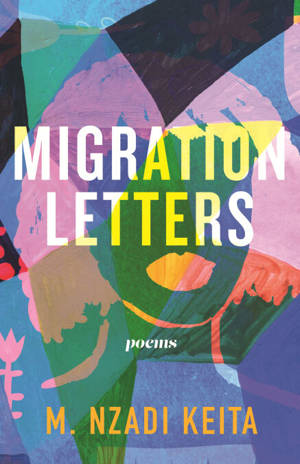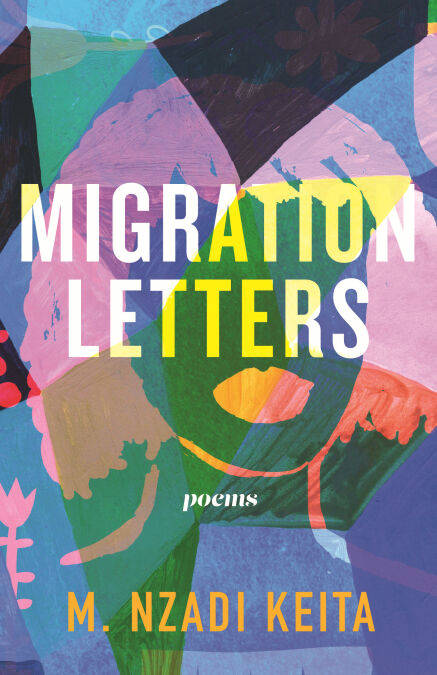
Bedankt voor het vertrouwen het afgelopen jaar! Om jou te bedanken bieden we GRATIS verzending (in België) aan op alles gedurende de hele maand januari.
- Afhalen na 1 uur in een winkel met voorraad
- In januari gratis thuislevering in België
- Ruim aanbod met 7 miljoen producten
Bedankt voor het vertrouwen het afgelopen jaar! Om jou te bedanken bieden we GRATIS verzending (in België) aan op alles gedurende de hele maand januari.
- Afhalen na 1 uur in een winkel met voorraad
- In januari gratis thuislevering in België
- Ruim aanbod met 7 miljoen producten
Zoeken
€ 17,74
+ 17 punten
Uitvoering
Omschrijving
A poetry collection that reflects on intimate aspects of Black history, culture, and identity, revealing an uncommon gaze on working-class Philadelphia from the 1960s to the present day
In 55 poems, Migration Letters straddles the personal and public with particular, photorealistic detail to identify what, over time, creating a home creates in ourselves. Drawn from her experiences of being born in Philadelphia into a Black family and a Black culture transported from the American South by the Great Migration, M. Nzadi Keita’s poetry sparks a profoundly hybrid gaze of the visual and the sensory. Her lyrical fragments and sustained narrative plunge into the unsung aspects of Black culture and explore how Black Americans journey toward joy.
Propelled by the conditions that motivated her family’s migration north, the poems pull heavily from Keita’s place in her family, communities, and the world at large. They testify to her time and circumstances growing up Black in Philadelphia on the periphery of the civil rights and Black Power movements. Each poem builds upon an inheritance of voices: a panoramic perspective of an Easter Sunday service in a Black church gives way to an account of psychic violence in a newly integrated school; the collective voices of a beauty salon’s patrons fragment into memories of neighborhoods in North Philadelphia that have faded over time.
Migration Letters strives to tell a story about Black people that radiates across generations and testifies to a world that, as Lucille Clifton wrote, “has tried to kill [us] and has failed.” They interrogate how one’s present begins in the past, what we gain from barriers and boundaries, and what notions of progress energize our journey forward. Keita’s poems intimately reveal how Black culture can be inherited and built upon complex relationships where love and pain are inextricably linked.
In 55 poems, Migration Letters straddles the personal and public with particular, photorealistic detail to identify what, over time, creating a home creates in ourselves. Drawn from her experiences of being born in Philadelphia into a Black family and a Black culture transported from the American South by the Great Migration, M. Nzadi Keita’s poetry sparks a profoundly hybrid gaze of the visual and the sensory. Her lyrical fragments and sustained narrative plunge into the unsung aspects of Black culture and explore how Black Americans journey toward joy.
Propelled by the conditions that motivated her family’s migration north, the poems pull heavily from Keita’s place in her family, communities, and the world at large. They testify to her time and circumstances growing up Black in Philadelphia on the periphery of the civil rights and Black Power movements. Each poem builds upon an inheritance of voices: a panoramic perspective of an Easter Sunday service in a Black church gives way to an account of psychic violence in a newly integrated school; the collective voices of a beauty salon’s patrons fragment into memories of neighborhoods in North Philadelphia that have faded over time.
Migration Letters strives to tell a story about Black people that radiates across generations and testifies to a world that, as Lucille Clifton wrote, “has tried to kill [us] and has failed.” They interrogate how one’s present begins in the past, what we gain from barriers and boundaries, and what notions of progress energize our journey forward. Keita’s poems intimately reveal how Black culture can be inherited and built upon complex relationships where love and pain are inextricably linked.
Specificaties
Betrokkenen
- Auteur(s):
- Uitgeverij:
Inhoud
- Aantal bladzijden:
- 160
- Taal:
- Engels
- Reeks:
Eigenschappen
- Productcode (EAN):
- 9780807008089
- Verschijningsdatum:
- 1/04/2024
- Uitvoering:
- E-book
- Beveiligd met:
- Adobe DRM
- Formaat:
- ePub

Alleen bij Standaard Boekhandel
+ 17 punten op je klantenkaart van Standaard Boekhandel
Beoordelingen
We publiceren alleen reviews die voldoen aan de voorwaarden voor reviews. Bekijk onze voorwaarden voor reviews.









